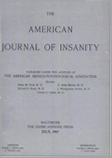PSYCHIATRIC ASPECT OF EDUCATION—GRADE PERIOD
Abstract
In summary I want to reemphasize that the grade period, both in school and in home and community, is not only a period of further self discovery for the child, but also a period of self-realization and a chance for the utilization of his own strengths as he begins to determine the nature of his interests and the quality of his responses. School is an instrument devised by our culture to give direction to part of the growth and to provide tools to aid the process of self-realization.
If too much rigidity and direction is provided, both in the content and in the quality of direction, the child may be blocked in the positive unfolding of his own interests and develop those negative attitudes which too commonly interfere with the achievement of the educational goal—self-direction in utilizing and developing own capacities. And if too little direction is provided, the child who has not achieved any very clear realization of what he is may be left too much to his own direction which can lead to confusion and inaction.
The psychiatrist with his interest in the growth steps of the child and his awareness of how this growth is influenced can make an important contribution to the advancement of educational procedure as it proceeds to perfect its program to provide a healthy medium to direct the learning of the child. I would like to see this contribution come through attention to some of these broader issues rather than in the interfering and more authoritative ways which Mr. Thayer correctly criticizes in his abstract.
Collaboration on a different basis, with mutual recognition of the contributions and limitations of the other, can lead to more application of sound principles of growth to this period of the child's educational life.
Access content
To read the fulltext, please use one of the options below to sign in or purchase access.- Personal login
- Institutional Login
- Sign in via OpenAthens
- Register for access
-
Please login/register if you wish to pair your device and check access availability.
Not a subscriber?
PsychiatryOnline subscription options offer access to the DSM-5 library, books, journals, CME, and patient resources. This all-in-one virtual library provides psychiatrists and mental health professionals with key resources for diagnosis, treatment, research, and professional development.
Need more help? PsychiatryOnline Customer Service may be reached by emailing [email protected] or by calling 800-368-5777 (in the U.S.) or 703-907-7322 (outside the U.S.).



